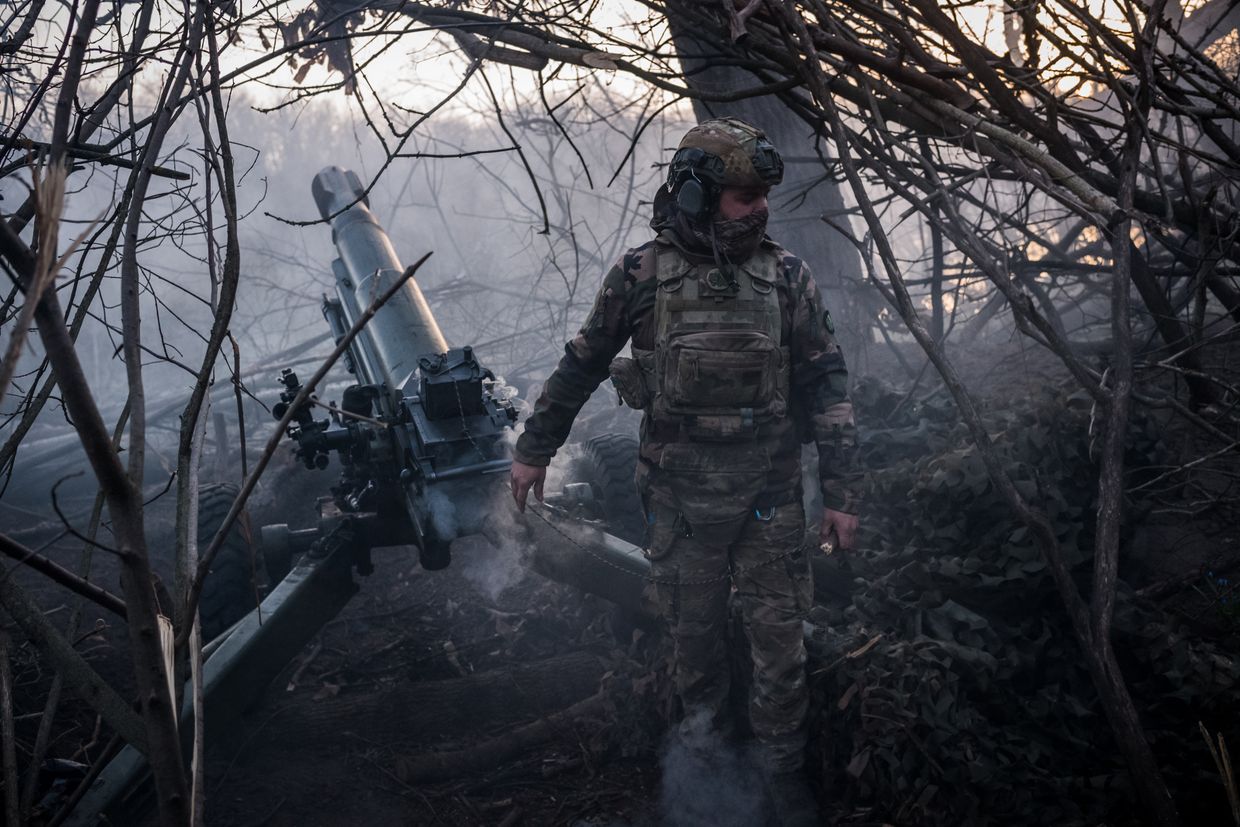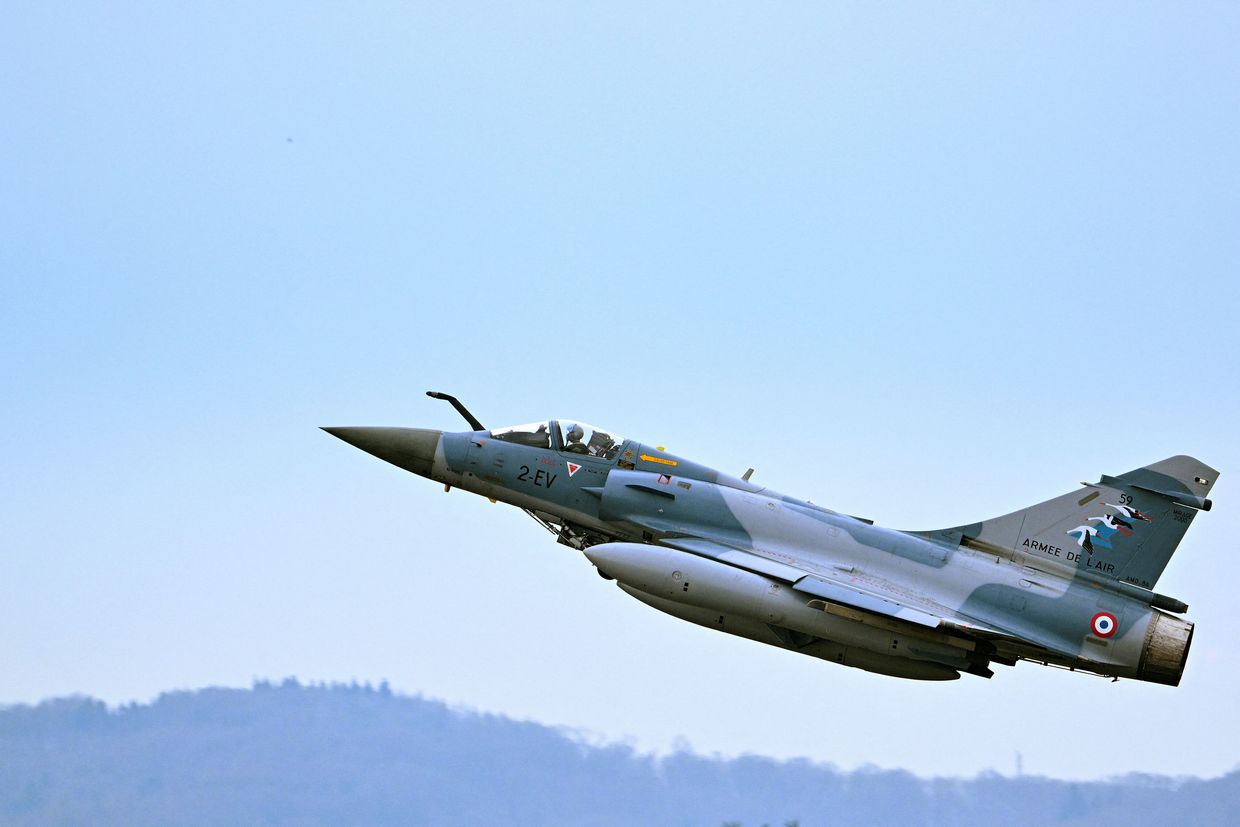Ukraine war latest: Ukraine strikes Russian S-400, S-300 systems in occupied Crimea, General Staff says

Key developments on June 10:
- Ukraine hit Russian S-400, S-300 systems in occupied Crimea overnight, General Staff says
- Ukraine refutes Kadyrov's claims about captured Sumy Oblast border village
- Russia uses submarines to patrol Black Sea after naval losses, military says
- Nearly 20,000 Wagner mercenaries died taking Bakhmut, media investigation confirms
- Some F-16s donated to Ukraine will be stored abroad as reserves, top officer says
Ukrainian forces attacked Russian S-400 and S-300 anti-aircraft missile systems in several areas in occupied Crimea overnight on June 10, Ukraine's General Staff said.
The statement came after a series of explosions were reported in the peninsula at night.
One S-400 anti-aircraft missile unit was hit near Dzhankoi, and two more S-300 anti-aircraft missile units were attacked near occupied Chornomorske and Yevpatoria, according to the military.
"None of our missiles fired were intercepted by the enemy's 'highly effective' air defense," the General Staff said.
"In addition, further detonations of ammunition were observed in all three areas of the launching positions of the Russian anti-aircraft missile divisions."
The General Staff did not provide further details on the consequences of the attack or what weaponry was used.
Russia's modern S-400 Triumph air defense system has an estimated price tag of around $1.2 billion.
Four S-400 launchers were destroyed in mid-April along with other equipment in an attack on a Russian military airfield in Crimea, Ukraine's military intelligence (HUR) reported.
The Ukrainian military reportedly struck the ferry crossing in occupied Kerch with U.S.-provided long-range ATACMS missiles overnight on May 30. Two Russian ferries were "significantly damaged," according to Ukraine's General Staff.
Moscow "actively used" the ferry crossing to supply Russian troops in the occupied peninsula and defended it with Russian Pantsir, Tor, and Triumph air defense systems, the Ukrainian military said.
Ukraine refutes Kadyrov's claims about captured Sumy Oblast border village
No Russian troops are present in the border village of Ryzhivka in Sumy Oblast as of the morning of June 10, President Volodymyr Zelensky said.
Russia attempted to carry out a "propaganda operation" in Ryzhivka, but Ukrainian forces "fully control the situation," according to Zelensky.
His statement came after Chechen dictator Ramzan Kadyrov claimed on June 9 that soldiers of the Akhmat-Chechnya regiment captured the Ukrainian village, sharing a video on Telegram purported to show their presence and fighting in the settlement.
Russian sabotage groups continue to be active in Sumy Oblast but "as of the morning, the Russian flag in the village (Ryzhivka) was destroyed," Zelensky said.
Ryzhivka, where reportedly fewer than 10 people remained as of the end of May, lays two kilometers from Russia's Kursk Oblast.
According to the crowd-sourced DeepState monitoring service that tracks changes on the front line, the village is in a "grey zone," and Russian sabotage groups are regularly attempting to break into it.
"They (Akhmat-Chechnya regiment) could have carried out this action on any other day of the year," DeepState wrote.

Volodymyr Artiukh, Sumy Oblast governor, also said that there are no Russian soldiers in the region.
Andrii Kovalenko, the head of an anti-disinformation department at the National Security and Defense Council, said there are no activities in the border area of Sumy Oblast, calling Kadyrov's claims a part of an information operation.
"As of now, this is not the beginning of what happened in Kharkiv Oblast. The defense forces are in control of the situation," Kovalenko said.
The Ukrainian military is yet to comment on the situation in Ryzhivka.
Kyrylo Budanov, Ukraine's military intelligence chief, suggested in mid-May that Russian forces may launch an offensive in Sumy Oblast similar to the one in Kharkiv Oblast when the conditions are more favorable.
Moscow failed to fulfill its Kharkiv operation, Zelensky said on June 8. In late May, Zelensky warned that Russia was forming another grouping of troops near Ukraine's northern border.
Since the Russian-occupied parts of Sumy Oblast were liberated in early April 2022, the region has been experiencing daily strikes from across the border, as it is located on Ukraine's northeastern border with Russia.
Ukrainian authorities ordered further evacuations from the region amid intensified attacks.
Russia uses submarines to patrol Black Sea after naval losses, military says
Russia started using submarines to patrol the Black Sea after a number of ships were attacked by Ukraine, Dmytro Pletenchuk, a spokesperson for the Southern Defense Forces and the Navy, said on national television on June 10.
Ukraine has repeatedly struck Russia's vessels since the beginning of the full-scale invasion. Around 30% of Russia’s Black Sea Fleet had been destroyed as of December 2023, according to the Ukrainian military.
"They (Russia) have already established practice where these submarines rotate in the morning. In the Azov-Black Sea region, they have four submarines, three of which are cruise missile carriers. Two submarines periodically go to sea," Pletenchuk said.
Russia is reportedly trying to organize naval exercises in the Azov Sea. To protect the ships from Ukrainian drone attacks, Russia is building barge-like structures, according to the spokesperson.
There are currently three Russian landing ships and three Buyan-M project small missile ships in the Azov Sea, Pletenchuk said.
Ukrainian forces reportedly crippled the Rostov-on-Don, one of the Russian fleet's four missile-capable submarines, in occupied Sevastopol in September 2023.
In one of the latest successful attacks, Ukrainian Magura V5 naval drones hit four Russian patrol boats of the KS-701 Tunets (Tuna) model in Crimea on May 30, Ukraine's military intelligence said. Two of them were reportedly destroyed, and two others damaged.

Nearly 20,000 Wagner mercenaries died taking Bakhmut, media investigation confirms
Nearly 20,000 Russian mercenaries died fighting for Wagner Group during the Battle of Bakhmut, an investigation by BBC Russia and Mediazona published on June 10 has found.
The outlets obtained documents shortly after the death of the group's founder, Yevgeny Prigozhin in August 2023, detailing the posthumous payments to relatives of those killed fighting in Ukraine between January 2022 and August 2023.
"This document contains more than 20,000 names of those killed," Mediazona writes, adding: "Most of the Wagnerites died in the 'Bakhmut meat grinder' – more than 19,500 people."
The numbers roughly confirm the number claimed by Prigozhin himself in May 2023 when he said he had lost more than 20,000 men in the fight for the town.
Prigozhin's Wagner began to bring tens of thousands of convicts from Russia's prisons into its ranks, including those convicted of rape and murder, during the group's main recruitment drive in late 2022.
Used in combination with the more professional and experienced Wagner units, the prisoners proved to be highly effective as an expendable assault force.
Their main success was the capture of Bakhmut, a city in Donetsk Oblast now razed to the ground, in May 2023 after a months-long battle.
The report also found 17,000 of those killed were former prisoners, pardoned by Russian President Vladimir Putin in exchange for heading to the front.
Using the identification numbers of those killed, journalists were also able to determine that at least 48,000 prisoners fought for Wagner during this time.
Prigozhin later that year launched a short-lived insurrection against the Kremlin in late June 2023, capturing the city of Rostov and marching toward Moscow.
However, less than 24 hours after starting the rebellion, it was declared over and he announced that he was turning his forces around and returning to base.
Following an undisclosed deal allegedly brokered by Belarusian dictator Alexander Lukashenko, the warlord was allowed to walk free and then released a video claiming to be in Africa.
Two months later – on Aug. 23 – a private jet with Prigozhin onboard crashed not far from Moscow, killing him and everyone else onboard.
According to unnamed U.S. officials cited by the Wall Street Journal (WSJ) on Aug. 24, the likely cause was a bomb onboard or "some other form of sabotage."
A later WSJ piece put the finger of blame on Nikolai Patrushev, Putin's "right-hand man."

Some F-16s donated to Ukraine will be stored abroad as reserves, top officer says
A number of F-16 fighter jets donated by Western allies to Ukraine will be stationed at air bases abroad, Serhii Holubtsov, a top officer at the Air Force Command, said in an interview with Radio Free Europe/Radio Liberty (RFE/RL) published on June 9.
Several NATO countries – Denmark, the Netherlands, Belgium, and Norway – have pledged to deliver dozens of U.S.-made F-16 jets from their stocks.
The first batch of Danish F-16s is expected to be handed over to Ukraine this summer.
Some of the Western aircraft will reportedly remain in training centers for Ukrainian pilots and aviation personnel outside Ukraine.
"There is a certain number of aircraft that will be stored at secure airbases outside of Ukraine so that they are not targeted here. And this will be our reserve, if necessary, to replace faulty aircraft during routine maintenance," Holubtsov said.
Ukraine already has plans for how many F-16s it will receive from allies this year and next year, according to Holubtsov. The number of aircraft located in Ukraine depends on the number of trained pilots, he said.
"The calculations have been made so that we know how many pilots we will have, how many engineers we will have, how many airfield maintenance personnel we will have," the officer added.
Several countries, including the U.S., pledged to assist Ukrainian aviators with the necessary training under the fighter jet coalition framework. The first group of Ukrainian pilots reportedly graduated from the F-16 training program in Arizona in late May and were sent to additional training in Europe.













